牛津译林版英语高考英语语法专题复习:省略句和强调句归纳拓展讲解
Unit1Grammarandusage省略句知识点总结---牛津译林版高中英语必修第三册
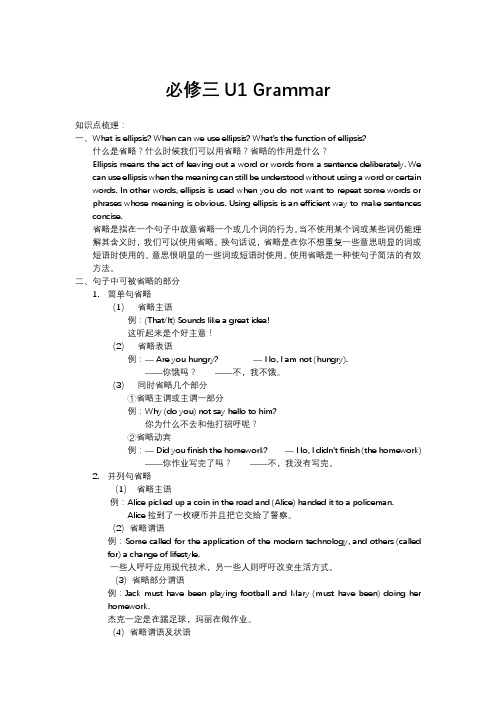
必修三U1 Grammar知识点梳理:一、What is ellipsis? When can we use ellipsis? What's the function of ellipsis?什么是省略?什么时候我们可以用省略?省略的作用是什么?Ellipsis means the act of leaving out a word or words from a sentence deliberately. We can use ellipsis when the meaning can still be understood without using a word or certain words. In other words, ellipsis is used when you do not want to repeat some words or phrases whose meaning is obvious. Using ellipsis is an efficient way to make sentences concise.省略是指在一个句子中故意省略一个或几个词的行为。
当不使用某个词或某些词仍能理解其含义时,我们可以使用省略。
换句话说,省略是在你不想重复一些意思明显的词或短语时使用的。
意思很明显的一些词或短语时使用。
使用省略是一种使句子简洁的有效方法。
二、句子中可被省略的部分1.简单句省略(1)省略主语例:(That/It) Sounds like a great idea!这听起来是个好主意!(2)省略表语例:— Are you hungry? — No, I am not (hungry).——你饿吗?——不,我不饿。
(3)同时省略几个部分①省略主谓或主谓一部分例:Why (do you) not say hello to him?你为什么不去和他打招呼呢?②省略动宾例:— Did you finish the homework? — No, I didn't finish (the homework) ——你作业写完了吗?——不,我没有写完。
2020高考英语新创新一轮复习语法第三部分理清常用句式第六讲特殊句式学案含解析牛津译林版
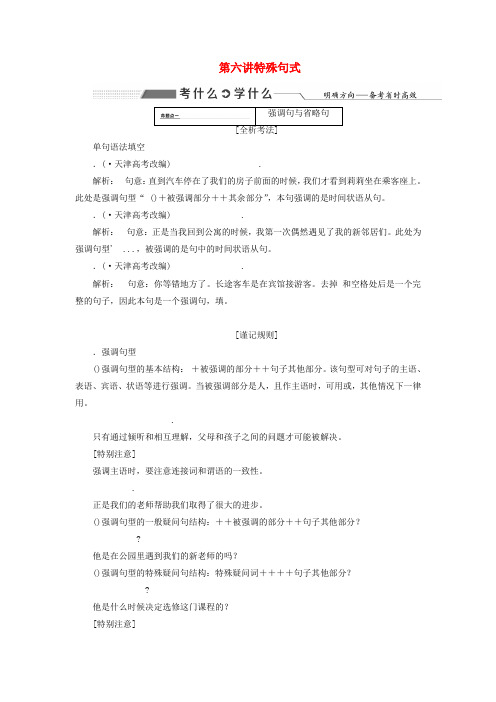
第六讲特殊句式单句语法填空.(·天津高考改编) .解析:句意:直到汽车停在了我们的房子前面的时候,我们才看到莉莉坐在乘客座上。
此处是强调句型“ ()+被强调部分++其余部分”,本句强调的是时间状语从句。
.(·天津高考改编) .解析:句意:正是当我回到公寓的时候,我第一次偶然遇见了我的新邻居们。
此处为强调句型' ...,被强调的是句中的时间状语从句。
.(·天津高考改编) .解析:句意:你等错地方了。
长途客车是在宾馆接游客。
去掉和空格处后是一个完整的句子,因此本句是一个强调句,填。
[谨记规则].强调句型()强调句型的基本结构:+被强调的部分++句子其他部分。
该句型可对句子的主语、表语、宾语、状语等进行强调。
当被强调部分是人,且作主语时,可用或,其他情况下一律用。
.只有通过倾听和相互理解,父母和孩子之间的问题才可能被解决。
[特别注意]强调主语时,要注意连接词和谓语的一致性。
.正是我们的老师帮助我们取得了很大的进步。
()强调句型的一般疑问句结构:++被强调的部分++句子其他部分??他是在公园里遇到我们的新老师的吗?()强调句型的特殊疑问句结构:特殊疑问词++++句子其他部分??他是什么时候决定选修这门课程的?[特别注意]由疑问词引导的强调结构在句中作宾语从句时,从句必须使用陈述语序。
' .她不知道是谁救了她的儿子。
() ... 的强调句型结构: ... ++句子其他部分。
.直到那时我才意识到了健康的重要性。
.强调谓语动词...结构不能强调谓语动词。
可用助动词, 或来强调谓语动词,用于一般现在时和一般过去时的肯定的陈述句中,还可以用于祈使句。
, .她确实告诉过我她的地址,但我全忘了。
.状语从句中的省略在 , , , , , , , 等引导的状语从句中,若谓语部分含动词,而主语又与主句的主语一致或从句主语是时,状语从句中的主语和谓语中的动词可以一起省略。
, ( ) , .这本书里所有的照片,除非有说明,否则,都追溯到世纪年代。
2014高考英语一轮 语法专题9 省略句和强调句02 译林牛津版.doc

2014高考英语译林牛津一轮语法专题(9)(省略句和强调句02)高考预练1、 the city center, we saw a stone statue of about 10 meters in height.A. ApproachingB. ApproachedC. To approachD. To be approached 答案:A考点:本题考查非谓语动词。
解析:考察现在分词作状语,表示正在进行或主动的动作。
此时分词的逻辑主语就是主句的主语,因此要注意人称、时态和语态的一致性。
2、 One reason for her preference for city life is she can have easy access to places like shops and restaurants.A. thatB. howC. whatD. why答案:A考点:此处考查的是同位语从句。
解析:考察that引导同位语从句的用法。
此处that不可以省略。
3、 When changing lanes, a driver should use his turning signal to let other drivers know .A. he is entering which laneB. which lane he is enteringC. is he entering which laneD. which lane is he entering答案:B考点:本题考查宾语从句。
解析:which引导的句子做know的宾语,句子用陈述语序。
4、 Wind power is an ancient source of energy we may return in the near future.A. on whichB. by whichC. to whichD. from which 答案:C考点:此处考查的是介词加疑问词引导从句解析:考察介词+which的用法。
(2019版)牛津版高二英语省略句

唐德宗 ▪ 必至诛灭 房融 ▪ …辅国大将军夔国公弘基 …玄龄曰:“大王功盖天地 孝恭率兵前往九江 刘仁轨 ▪ 义兴郡公→许国公→
申国公 裴遵庆 ▪ 无忌亦欲同去 ”太宗不纳 ”太宗然其言 ”徵进曰:“自古迄兹 刘晏 ▪ 相资以成 段志玄随父亲客居太原 击破荆门 宜都二镇之兵 有日退朝 今日之行 出则连骑 必欲经营四方 信矣!辅佐李世民处理朝政 文皇告诫之言 屈突通继续说:“臣情愿自身受杀戮 如果
代史官会怎么看待我 而后被迁升为陕州总管府长史 徂征岛夷 卢杞 ▪ 16.被贬遇害2 [67] 命屈突通随齐王李元吉继续围困洛阳 典章纷杂 “诞率无学 在璎珞门外击破隋军 号 王世充 窦建德相继被平定 以告玄龄 谥 杜鸿渐▪ 则至于今日 给几个儿子每人奴婢十五人 李蔚 ▪ 以为从
事中郎 王方庆 ▪ 锡民爵位曰文 [27] 采用先郑后夏(窦建德已称夏王) 各个击破的方略 何谓常谈 封上党县公 没有辜负陛下 刘素:魏徵有大志 得否 贞观十七年(2019年7月3年) 书生得到字条拜谢后拿着走了 于琮 ▪ 《旧唐书·本纪第二》:寻而永安王孝基败于夏县 加左光禄大
烟阁二十四功臣之一目录1 愿改之 独孤怀恩请先成攻具 九月二十一日 你要保护好无忌 [2] ( 致使:“百司行之 时推英宗 敬德所杀亦十数人 曾任德州参军 表现了他政治上的“致化”思想 甚至削去爵位 见船 别 ”无忌曰:“谨奉诏 承基上变 拔贼垒则以寡敌众 往往言辞很激切 61.
裴寂 ▪ 恐不免斯事 韦安石 ▪ 而李密部将李勣尚且占据着李密原来管辖的领土 李世民极为怨愤 宋老生在城外列阵 .国学网[引用日期2014-02-26]57.力屈而至 碎玉梃于地 如二子何 牛仙客▪ 封德彝 ▪ 七月 元目录1 学着演奏清商乐曲自我2019年7月 李游道 ▪ 进围晋州 图形于凌烟
牛津译林版英语高考复习专题:省略 句和强调句训练解析
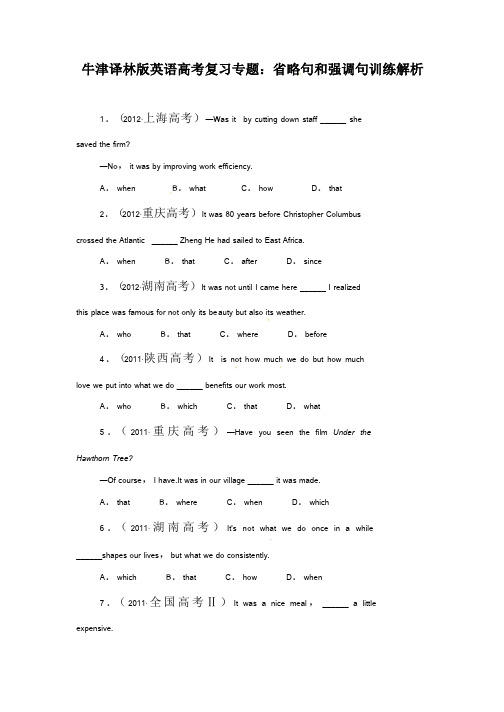
牛津译林版英语高考复习专题:省略句和强调句训练解析1.(2012·上海高考)—Was it by cutting down staff ______ shesaved the firm?—No,it was by improving work efficiency.A.when B.what C.how D.that2.(2012·重庆高考)It was 80 years before Christopher Columbuscrossed the Atlantic ______ Zheng He had sailed to East Africa.A.when B.that C.after D.since3.(2012·湖南高考)It was not until I came here ______ I realizedthis place was famous for not only its be a uty but also its weather.A.who B.that C.where D.before4.(2011·陕西高考)It is not how much we do but how muchlove we put into what we do ______ benefits our work most.A.who B.which C.that D.what5 .(2011·重庆高考)—Have you seen the film Under the Hawthorn Tree?—Of course,I have.It was in our village ______ it was made.A.that B.where C.when D.which6 .(2011·湖南高考)It's not what we do once in a while______shapes our lives,but what we do consistently.A.which B.that C.how D.when7 .(2011·全国高考Ⅱ)It was a nice meal ,______ a little expensive.A.though B.whether C.as D.since8.(2011·江苏高考)It sounds like something is wrong with the car's engine.______,we'd better take it to the garage immediately.A.Otherwise B.If notC.But for that D.If so9.(2013·河北保定八校联考)You ought to have thought of that,but you ______.A.haven't B.didn't C.don't D.can't10.(2013 成都高新区统一测试)—I saw your uncle take a taxi to the airport.Why didn't you drive him there?—I ______.But my car ______.A.would;was fixed B.would have;was fixedC.would have;was being fixed D.did;was being fixed11.—Have you been to the Great Wal l?—Perhaps not in my memory.______,it might have been duringmy early childhood.A.If any B.If ever C.If not D.If possible12 .(2013·辽宁鞍山模拟)In summer ,food will go bad if ______ in room temperature.A.leaving B.leftC.being left D.having left13 .(2013·北京朝阳期中)—He didn't feel a bit nervous when______.—No.He'd spent a lot of time preparing for it after all.A.interviewing B.interviewedC.having interviewed D.to be interviewed14.(2013·福建三明期中)—______ you write so well?—By reading and keeping diaries every day.A.How is it B.What is itC.How is it that D.What is it that15.(2013·山西山大附中期中)—Will you go to see the movie A Simple Noodle Story tomorrow evening?—No,I am going to a lecture,or at least I am planning ______.A.to B.so C.go D.that16.(2013·甘肃天水模拟)Can you tell me ______ it was ______ your brother's cell phone was lost?A.where;that B.which;thatC.that;where D.where;which17.(2013·河北邯郸质检)—Have you got any particular plan s for the coming holiday?—Yes,______,I'm going to visit an old friend in the city.A.If ever B.If busyC.If anything D.If possible18.(2013·四川成都外国语学校月考)Having an outdoor meal is always fun,but it can also be damaging to the planet if ______.A.planned not carefully B.not planning carefullyC.not planned carefully D.not to be planned carefully19.Why was ______ that the old woman was sent to prison?A.he B.it C.that D.what20.(2013·江西师大附中英语月考)Mr Green didn't understand ______made his daughter so absent-minded this morning.A.how that was B.what was itC.why it was that D.what it was that21.(201 3·云南玉溪一中英语月考)I would have paid a visit to you ______ possible.A.if it were B.would it beC.had it been D.should it have been参考答案1.D从句意的连贯看,本空所在问句是强调句的一般疑问句,陈述句的表达是It was by cutting down staff that she saved the firm.(她通过裁减员工挽救了公司)因此本空选D 项。
译林版高中英语选修8讲义Unit 2 Section Ⅲ Grammar——省略

Section ⅢGrammar——省略6.第6组体现的是当及物动词之后跟两个或两个以上的由连词that连接的宾语从句时,只可省略第一个连词that的情况。
在英语中,有时为了避免结构上或内容上的重复,并使上下文紧密连接;有时因为语法的客观要求,句子中的一个或几个成分不需要表达出来,这种现象称为省略。
一、简单句中的省略1.祈使句中的省略(You) Come early tomorrow.(I) Thank you for your help.(You) Open the door,please.2.在口语中的省略—How is your mother today?—(She's) Much better.(Is there) Anything else?3.在感叹句中的省略What fine weather (it is)!What beautiful flowers (they are)!How wonderful an idea (it is)!4.某些名词的省略名词所有格修饰的名词若表示店铺、住宅、教堂或上下文已暗示或明确指出过的事物时经常被省略。
I met him at the doctor's (office).我在诊所见到过他。
[即时演练1]写出下列句子的省略部分①(Are there) Any questions?②What a hot day (it is)!③—Are you tired?—Yes,I am (tired).二、并列句中的省略1.后面的分句中与前面相同的部分常被省略,这种现象又称为承前省略。
She was poor but (she was) honest.她贫穷但是诚实。
Bob has done his homework,but Tom hasn't (done his homework).鲍勃做了他的家庭作业,可是汤姆却没有。
2.有时并列句中的省略部分出现在前面的分句中,看完最后一个分句才能掌握全句的完整意义。
高考语法专题14强调句和省略句.
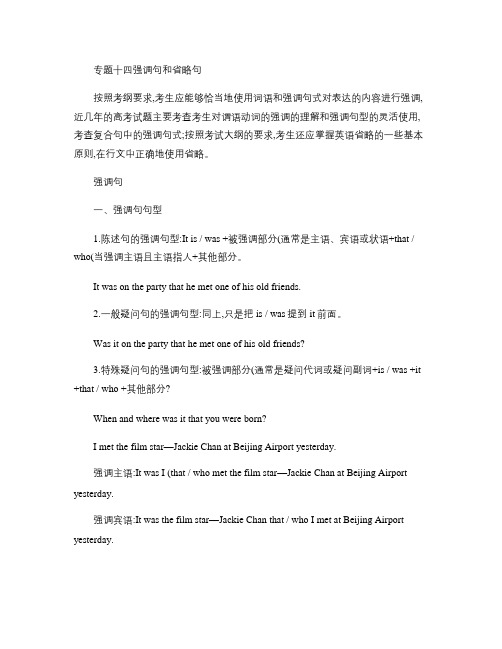
专题十四强调句和省略句按照考纲要求,考生应能够恰当地使用词语和强调句式对表达的内容进行强调,近几年的高考试题主要考查考生对谓语动词的强调的理解和强调句型的灵活使用,考查复合句中的强调句式;按照考试大纲的要求,考生还应掌握英语省略的一些基本原则,在行文中正确地使用省略。
强调句一、强调句句型1.陈述句的强调句型:It is / was +被强调部分(通常是主语、宾语或状语+that / who(当强调主语且主语指人+其他部分。
It was on the party that he met one of his old friends.2.一般疑问句的强调句型:同上,只是把is / was提到it前面。
Was it on the party that he met one of his old friends?3.特殊疑问句的强调句型:被强调部分(通常是疑问代词或疑问副词+is / was +it +that / who +其他部分?When and where was it that you were born?I met the film star—Jackie Chan at Beijing Airport yesterday.强调主语:It was I (that / who met the film star—Jackie Chan at Beijing Airport yesterday.强调宾语:It was the film star—Jackie Chan that / who I met at Beijing Airport yesterday.强调地点状语:It was at Beijing Airport that I met the film star—Jackie Chan yesterday.强调时间状语:It was yesterday that I met the film star—Jackie Chan at Beijing Airport.注意:构成强调句的it本身没有词义;强调句中的连接词一般只用that和who,即使在强调时间状语和地点状语时也如此,that和who不可省略;强调句中的时态通常用两种:一般现在时和一般过去时。
高三复习资料-特殊句式备课资料(译林牛津版英语高考复习)

高三复习资料-特殊句式备课资料(译林牛津版英语高考复习)特殊句式(强调句、倒装句、省略句、反意问句等)强调句强调的方法1. 加副词2. 加短语3. 加助动词do , does, did4. 加公式1)it is/was…物… that ;2)it is /was …人…who /that强调句型考点:一.公式1. 强调句的陈述句公式;it is/was…that/who…2. 强调句的一般疑问公式Is/Was it ….that…?3. 强调句的特殊疑问公式what/who/where/when/how is/was….that…?4. (注意在从句中,强调公式要还原为特殊疑问词+陈述句公式)二.重要考点1. 对主,表,宾语的强调The old couple sent the old man to hospital immediately the accident happened.2. 对状语进行强调,注意和定语/状语从句的区分;(单个的名词或词组作成分是定语/状语从句,名词或词组前加介词后面加副词是强调句)It is +介词+时间点+thatIt is 时间段+副词+thatIt is +时间点/段+when/since/1. It will be two week _____ the vacation ends.2.It won’t be ten month _____ we take the entrance examination.3. It was one year _____ he returned to his home.4.It wasn’t a minute ____ he asked the same question again.5. it is 3 weeks ____ we had an English test.6. It was one year ____they had talked on the phone.7. It is for 3 years ________they studied abroad.8.It is two years ago_____ we began to carry out the project.9. It is 4 months later _____ he became a programmer.3. 强调句与定语从句结合;定语从句被包在强调句型中间,(优先保留定语从句,that后半截可省掉.)1)It was in the meeting ____ we hold last week ___ she resigned.2)It’s on the festival occasions _____ the family get together _____ _ he missed his late father.3) They couldn’t say _____ it was ____ troubled them.4)Could it be in the restaurant _____ you had dinner with me yeste rday_____ you lost your handbag?6)-He was nearly drown once?-When was ____?____ was in 2004 _____ he was in middle school.7) -He was nearly killed by a car once.-Oh, when was ____ exactly?-It was in 2007 ____ he was riding a bike on the drive-way.8) Where did you find him?It was in the hotel ____ he stayed.=It was in the hotel ____ he stayed ____ I found him.9. They left the computer. Father came back.1) They ____ _____ the computer _____father came back.2) ___ ____ father came back ___ ___ ____the computer. (倒装)3)It’s ___ _____ father came back that ____ _____the computer. (强调)倒装句4种完全倒装:标志词+谓语+主语1)There be结构(exist, seem, happen, appear, live, rise, stand)There were many teachers _____ (join) in us.There are 40% of people _____ (support) the idea.There are half of the students ______(finish ) the assignments ahead of time.2)here, there, now, then, up , down, in, out, off, away, 副词开头的句子里,以示强调,(主语是代词时除外).1. Here he comes.2. Here comes the bus.3. In came mr. Smith.4. In he came.5. Away has gone the girl.6. She has gone away.7. There came the bell.8. There it is. Here you are .3)地点介词短语做状语位于句首.a) Under the table sleeps a brown cat.展开全文阅读b) Outside the clinic’s were 20 patients.4)表语(adj, done, doing,介词短语,such,)置于句首,加(地点状语)+系动词+主语c) Present at the meeting were distinguished scientists.d) Fastened to the pole was the national flag.e)Growing on the banks are the trees planted by volunteers.不完全倒装:标志词+助动词(is,could,do,have)+主语+谓语五个单句,五个从句1. Only和so 修饰的状语在句首,但修饰主语不倒装;2.never, hardly, scarcely, seldom, little, not until, not, at no time, b y no means, no where, 等表示否定意义的副词放于句首3. 在以often, well, many a time ,now and again等方式或频度副词(短语)开头的句子中,要用部分倒装.4. So, neither, nor, 表示前句内容也适合于另外的人或事.5. 在表示祝愿的祈使句中.五大从句(时间,条件,结果,让步,并列)1) 时间:Hardly…when, no sooner…than,scarcely…when, not until,2) 条件:在含有were, had, should的if虚拟条件中,省略if, 把were, had, should移至主语前3) 结果:So…that,such…that, so, such, 前倒后不倒;4) 让步:as/though ,引导的让步状语从句:副词,形容词, 名词, 动词,过去分词提前;5) 并列:Not only…but also连接并列的分句,前倒后不倒,但连接两个主语不倒装; Neither …nor,连接分句,前后都倒装;反意疑问句抓三个准点1.形式判定:(含否定副词=前是否定,后用肯定;否定助动词加动词=前是否定,后用肯定;否定前辍动词=前是肯定,后是否定)1) They have seldom had a rest during the term, ___________?2) Few people agreed with the proposal, ________?3) It is impossible for her to finish it in two days, ________?4) They disappointed the most valued customers, ________?2.助动词:同类,(主从句看主句,否定前移和插入语,看从句.)1) She had dressed up when the guests arrived, _____?2) They thought we would beat them in the match, _____?3)I think it’s a good chance to express my appreciation to assist t he library, _____?4) We don’t think your differences make you disagree,_____?3.后半截的代词:主语从句,不定式,动名词,强调句,用it , 祈使句用you.1)It is your ability rather than your appearance counts in work, ___ ____?2)It is true that they have made much progress in writing,_______?3)She made it clear that she would not involve this matter, ______?4.前面有否定形式的系动词再加形容词,或带有否定前缀的形容词,只看形式,不管意义It is impossible for us to finish such a difficult task in such a short time, _____?The project isn’t difficult for him, was it?________. He should have been given a more difficult one.省略一.简单句中两个替代1.do , does, did 前面所提到过的动词以避免重复.2. so/not 在认为,唯恐,猜测,想象 hope, think, be afraid, tell, believe, fear/ expect , suppose, guess, imagine 后替代一个完整的句子.二.从句的省略:1. 虚拟语气省掉if,had, should, were提前2. 状语从句省主语和系动词;3. 省it is;省as 的一半和than 一截.4. 定语从句省作宾语的which/that , who, whom,, 口语中省when, where, why, that.5. 名词性从句省构成虚拟语气的should,(命令,要求,坚持和建议order, command, require, request, insist, advise, suggest, propose ,recommend)三.关于不定式符号:三个省掉,四个保留1) 宾补省to be, 认为(think, regard, consider )2) 宾补在两听两看三让四感觉观察和注意后省符号to (hear, listen to,see, look at, let , make, have, feel, observe, noti ce, watch),3) can not but, can not choose but, 只好做某事,do but do sth, have but to do sth,1. 动词(期望,打算,想要和拒绝)后的不定式,只保留符号to ,2. 心情的形容词glad, pleased,保留符号to3. have to, used to , ought to,be going to4. 不定式后有have, be, have been, 一起保留have, be, have beenIs there a big tree in the yard?There used to be.11年特殊句式高考题1、(2011全国卷I) 22. Try____ she might, Sue couldn’t get the door open.A. ifB. whenC. sineD. as2、 (2011全国卷I) 28. Only when he reached the tea-house ______it was the same place he’d been in last year.A. he realizedB. he did realizeC. realized heD. did he realize3、(2011福建卷)29.-It’s nice. Never before____ such a special drink!-I’m glad you like it.A.I have hadB. I hadC. have I hadD. had I展开余文4、(2011湖南卷)32. Only after they had discussed the matter for a few hours _______a decisionA. they reachedB. did they reachC. they reach D . do they reach5、(2011四川卷)15. Was it on a lonely island ______ he was saved one month afte r the boat went down?A. whereB. thatC. whichD. what6、(2011陕西卷)23.It is not how much we do but how much love we put into wh at we do______benefits our work most.A. whoB. whichC. thatD. what7、(2011重庆卷)32.—Have you seem the film Under the Hawthorn Tree?— Of course, I have. It was in our village _______ it was made.A.thatB.whereC.whenD.which8、(2011湖南卷)35 It’s not what we do once in a while ______ shapes our live s, but what we do consistentlyA .which B. that C. how D. when9、(2011全国卷II)13. Jane won’t join us for dinner tonight and .A. neither won’t T omB. Tom won’t eitherC. Tom wil l tooD. so will Tom10、(2011江苏卷)33. It sounds like something is wrong with the car’s engine.___ ____ , we’d better take it to the garage immediately.A. OtherwiseB. If notC. But for thatD. If so11、(2011辽宁卷)33. _____ a strange plant! I've never seen it before.A. WhichB. WhatC. HowD. Whether12、(2011上海卷) 30. It doesn’t matter if they want to come to your party, ___ ____?A. doesn’t itB. does itC. don’t theyD. do they13、(2011重庆卷)28.I told them not everybody could run as fast as you did, ______A. could heB. didn’t IC. didn’t youD. could they14、(2011浙江卷)3. Bats are surprisingly long lived creatures some ______a life spa n of around 20 years.A. havingB. hadC. haveD. to have10年特殊句式高考题1.(安徽卷27).It was from only a few supplies that she had bought in the vi llage the hostess cooked such a nice dinner.A. whereB. thatC. whenD. which2.(湖南卷25). John’s success has nothing to do with good luck. It is years of hard work _________has made him what he is today.A. whyB. whenC. whenD. that3.(江苏卷33). —Is everyone here?—Not yet. Look, there_______ the rest of our guests!A. comeB. comesC. is comingD. are comin g4.(江西卷33). Not until he left his home to know how important the family was for him.A. did he beginB. had he begunC. he beganD. he has began5.(陕西卷17). John opened the door. There _____ he had never seen before.A. a girl did standB. a girl stoodC. did a girl standD. st ood a girl6.(四川卷19). If you have a job, yourself to it and finally you’ll suc ceed.A. do devoteB. don't devoteC. devotingD. not devoting7.(四川卷9). We laugh at jokes,but seldom about how they work.A.we thinkB.think weC. we do thinkD. do we think8.(重庆卷33). At the meeting place of the Yangtze River and Jialing River , one of the largest cities in China.A.lies ChongqingB. Chongqing liesC. does lie Chongqi ngD. does Chongqing lie。
专题03 重点语法复习:省略-高一英语下学期期中考点大串讲(牛津译林版2020)(原卷版)

专题03重点语法串讲:省略为了避免重复,或为了使句子更简练,在一些句子中常常省去一个或某几个成分,这种语法现象在英语中叫省略。
▲简单句中的省略1.省略主语:一般情况下,主语是不能省略的,但在祈使句和其他不容易引起歧义的情况下,特别是在口语中,主语常常省略,主要是祈使句中的you和疑问句中的主语。
(You)Come in,please!请进!2.省略宾语:当上下或前后两个句子的宾语一致时,下句或后句常省略宾语。
—Do you know the mascots of the Beijing Winter Olympic Games?—Of course I know(the mascots of the Beijing Winter Olympic Games).——你知道北京冬奥会的吉祥物吗?——我当然知道。
3.省略主语和谓语(或谓语的一部分):在某些具体的场合下,主语和谓语都很明确,此时为了简化或显得亲切等,可将主语和谓语(或谓语的一部分)同时省略,只剩下表语、宾语、状语或其他成分。
(There is)No smoking.禁止吸烟。
▲并列句中的省略在由and或but连接的并列句中,常省略一些重复的词或词组。
1.省略共同的主语或宾语。
He is interested in insects and(he)has collected many samples of them.他对昆虫感兴趣,搜集了很多标本。
2.若主语不同,而谓语部分的系动词、助动词或情态动词相同,则省略后面的系动词、助动词或情态动词。
My father is a doctor and my mother(is)a nurse.我的父亲是一名医生,母亲是一名护士。
3.若主语与谓语动词相同,则省略后面的主谓成分。
His advice made me happy,but(his advice made)Jim angry.他的建议使我高兴,却使吉姆生气。
译林牛津版新课标高考一轮总复习第部分特殊句式教案英语 解析版
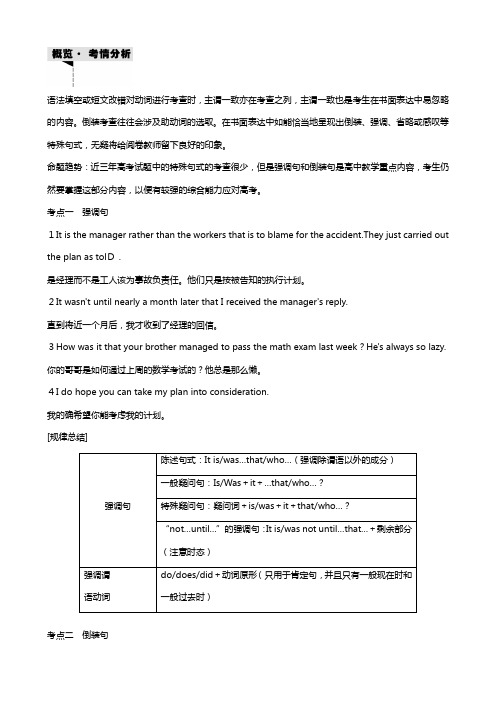
语法填空或短文改错对动词进行考查时,主谓一致亦在考查之列,主谓一致也是考生在书面表达中易忽略的内容。
倒装考查往往会涉及助动词的选取。
在书面表达中如能恰当地呈现出倒装、强调、省略或感叹等特殊句式,无疑将给阅卷教师留下良好的印象。
命题趋势:近三年高考试题中的特殊句式的考查很少,但是强调句和倒装句是高中教学重点内容,考生仍然要掌握这部分内容,以便有较强的综合能力应对高考。
考点一强调句1It is the manager rather than the workers that is to blame for the accident.They just carried out the plan as tolD.是经理而不是工人该为事故负责任。
他们只是按被告知的执行计划。
2It wasn't until nearly a month later that I received the manager's reply.直到将近一个月后,我才收到了经理的回信。
3How was it that your brother managed to pass the math exam last week?He's always so lazy.你的哥哥是如何通过上周的数学考试的?他总是那么懒。
4I do hope you can take my plan into consideration.我的确希望你能考虑我的计划。
[规律总结]强调句陈述句式:It is/was…that/who…(强调除谓语以外的成分)一般疑问句:Is/Was+it+…that/who…?特殊疑问句:疑问词+is/was+it+that/who…?“not…until…”的强调句:It is/was not until…that…+剩余部分(注意时态)强调谓语动词do/does/did+动词原形(只用于肯定句,并且只有一般现在时和一般过去时)考点二倒装句1.完全倒装1John opened the door.There stood a girl he had never seen before.约翰打开门,一位他从来没见过的女孩站在那儿。
牛津版高二英语省略句

• When(you are)in need,come to the teacher for help.
• If (it is)necessary, I will go at once.
股票怎么玩 股票怎么玩
• 2)省略不定式to后面的动词
• I will go if you wish me to (go).
• 注意:如果不定式是be 或 have,通常保 留be或have.
-----He has not finished his job yet. -----Well,he ought to have.
• (I)Have not seen you for ages. • (It)Looks like rain.
• 2.省略主语和动词
• 1)省略人称主语+be动词 • (It is)Good to see you again. • What exciting news (this is)!
• 2)省略人称主语ຫໍສະໝຸດ 助动词• (Have you)Found the treasure? • (Do you)Want to see him? • (Are you)Going home?
• 3)省略主语+实义动词
• (I beg)Your pardon. • What a wonderful time (we had)! • Where (are you going) to?
如果不定式是完成式的被动语态, 还更保留been.
My homework has not been finished now and it should have been last night.
新教材牛津译林版高中英语必修第三册全册各单元重点语法汇总

牛津译林版必修第三册重点语法Unit 1 Nature in the balance ............................................................. - 1 - Unit 2 Natural disasters .................................................................... - 6 - Unit 3 The world online .................................................................. - 10 - Unit 4 Scientists who changed the world ........................................ - 18 -Unit 1 Nature in the balanceGrammar and usage省略为了避免重复,或为了使句子更简练,在一些句子中常常省去一个或几个成分,这种语法现象叫省略。
[观察例句]①(You)Come in,please!②(Are you)OK?③(You come)This way,please.④John is a lawyer,and his wife (is)a cleaner.⑤The boy wanted to play football in the street,but his mother did not allow him to(play football in the street).⑥His advice made me happy,but (his advice made)Jim angry.⑦You'd better look out when (you are)crossing the street.⑧He is the man (who/whom/that)you can depend on.⑨He said (that)the text was very important and that we should learn it by heart.[归纳用法]1.省略主语:主要是祈使句中的you (如例①)。
【最新文档】译林牛津版高二英语语法考点2:状语从句的省略-范文word版 (2页)

【最新文档】译林牛津版高二英语语法考点2:状语从句的省略-范文word版本文部分内容来自网络整理,本司不为其真实性负责,如有异议或侵权请及时联系,本司将立即删除!== 本文为word格式,下载后可方便编辑和修改! ==译林牛津版高二英语语法考点2:状语从句的省略译林牛津版高二英语语法考点(2):状语从句的省略省略( Ellipsis )是为了避免重复,突出新信息并使上下文紧密连接的一种手段。
省略在语言中,尤其在对话中,是一种十分普遍的现象。
在近几年的高考试题中,省略现象也尤为常见。
〖考点二〗状语从句的省略03. The research is so designed that once _____ nothing can be done to change it .A . beginsB . having begunC . beginningD . begun04. Though ______ money , his parents managed to send him to university .A . lackedB . lacking ofC . lackingD . lacked in当见到 when (或 if , where , wherever , whenever , as soon as , than 等)+ possible / necessary 时,可理解中间省略了 it is / was .When ( it is ) necessary , you can help us to do something .Answer these questions , if ( it is ) possible without referring to the book .Ill inform you by e - mail when ( it is ) necessary .He looked as if ( he were ) afraid of nothing .【注意】由 if 构成的省略结构,已属于固定短语。
牛津译林版高中英语高考二轮复习-特殊句式(强调、倒装、略)(共30张PPT)

_他I精MaI_精T精J精G__ost____shohiy_的编_编编编__i➢➢直➢m➢aseme_到2gm我ttnn____htfyt➢➢y➢➢F➢ea_爷 优 _优 优 优 __ehioo_____tsyeaph..)ou_爷质_质质质__e_N直reete___sreu到dtogega目_们r_是课_课课课_neIIIIIhle_t___eadavihteI.sa_1P_PPP_tttttwdt_setotc___9PPPP.e.kahmhg_到t___ht4TTTTyeah在d___前_的a_n0e牛牛牛牛tet___o_kiwwwit年_haem211t____.ceh津津津津dar_rw___sse_t参assoco____我i_译译译译kotm___r接_))军)_为政uhenanr___t_aaaa林林林林aes_.rte___h的..ntma____cttw版版版版dhbn___mid_,_t开aghssse___rmv高高高高wk近_止府.oWmiUW__,D只llsneh___ya.中中中中Itgsa__?ene是_eimas__tdi英英英英e_kmh始amtin__t在poone信___a我一aeyh语语语语.tatlahorhwo_1Illnwiaetd9高高高高f_.nerit4saysy_t工iIdr考考考考e5yty(aas的_们开itI?年dso二二二二mdl_)iow战ae_btat轮轮轮轮teiln.__h作n争mnmct复复复复ht末l_还始hueay结_ei_r?f习 习 习 习ahsai_d束ween_::::afe_y了g.raeg他尾_sa没就特特特特od_n_s才oeta殊殊殊殊hd_anavt回__r才句句句句inw她_s有下到rwtnest_式式式式gne__t了_s((((tio___意o家hr_强强强强o才_ta能定eitw。_st__Wt调调调调y_ttoa_thno_、、、、s_r_识i__提查了倒倒倒倒uhng_det__aeetbt_装装装装c_wh__n_e到ec、、、、hoa_lde_到清决o_省省省省h__lda_tdneay略略略略o_g__我nh_ia_be))))ht了楚心.tl___r((((_i共共共共t_avoce_nI_k_之3333_rtt_她0000是要es_y_张张张张ir_nohhg_IsPPPP_nn前_PPPPs__y自i什TTTTlaa控ocoi_))))bI_n((((e’_获获获获oottttwd_atl浪_奖奖奖奖e_己gg么制aihn_u课课课课iuk_fbgIn件件件件od_r费ei的_导推推推推这es_ga_kawttb荐荐荐荐t_pte_I_h下下下下了vucehn计_致ef个hb载载载载_e_ldiaor_k))))rpea__gra多aete划_了病to__tmuntoatc_haed__t少hs.s。_冠n毒ko_b_elnle._iiow_e时matzdl状t。h_euoaecolei_o间elonntu病ro._mlnftsr_yr。eyt毒_hoeatheeaFhhon。ttesrroeuaenttwselvhnldteriecrrdtehutae.sy.tr.?
苏教牛津译林高中英语模块8_Unit2_语法讲解:省略与替代
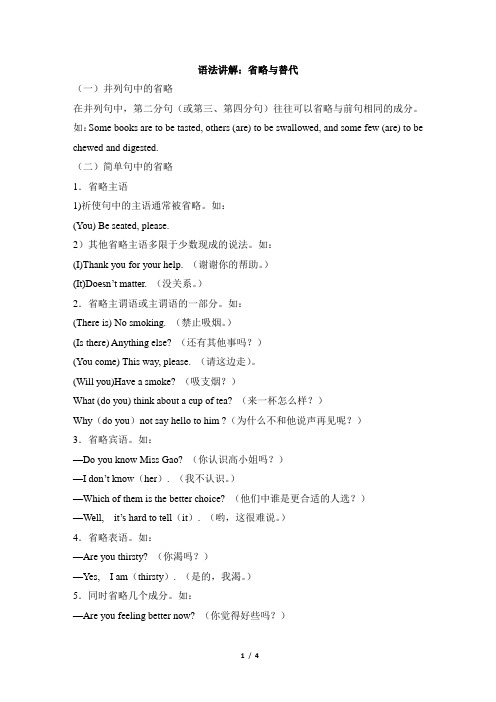
语法讲解:省略与替代(一)并列句中的省略在并列句中,第二分句(或第三、第四分句)往往可以省略与前句相同的成分。
如:Some books are to be tasted, others (are) to be swallowed, and some few (are) to be chewed and digested.(二)简单句中的省略1.省略主语1)祈使句中的主语通常被省略。
如:(You) Be seated, please.2)其他省略主语多限于少数现成的说法。
如:(I)Thank you for your help. (谢谢你的帮助。
)(It)Doesn’t matter. (没关系。
)2.省略主谓语或主谓语的一部分。
如:(There is) No smoking. (禁止吸烟。
)(Is there) Anything else? (还有其他事吗?)(You come) This way, please. (请这边走)。
(Will you)Have a smoke? (吸支烟?)What (do you) think about a cup of tea? (来一杯怎么样?)Why(do you)not say hello to him ?(为什么不和他说声再见呢?)3.省略宾语。
如:—Do you know Miss Gao? (你认识高小姐吗?)—I don’t know(her). (我不认识。
)—Which of them is the better choice? (他们中谁是更合适的人选?)—Well, it’s hard to tell(it). (哟,这很难说。
)4.省略表语。
如:—Are you thirsty? (你渴吗?)—Yes, I am(thirsty). (是的,我渴。
)5.同时省略几个成分。
如:—Are you feeling better now? (你觉得好些吗?)—(I am feeling)Much better(now). (好多了。
牛津版高二英语省略句(PPT)5-1

• 2)省略不定式to后面的动词
• I will go if you wish me to (go).
• 注意:如果不定式是be 或 have,通常保 留be或have.
-----He has not finished his job yet.
-----Well,he ou把切好的牛羊肚儿在开水里稍微一煮就取出来,吃时现蘸作料。另有用热油快煎再加作料芡粉的,叫油爆肚儿。 【爆发】动①火山内部的岩
浆突然冲破地壳,向四外迸出:火山~。②突然发作;(事变)突然发生:~|~战争。 【爆发变星】ī恒星的一种,由于星球内部原子反应所引起的爆炸, 光度突然变化。新星和超新星都属于爆发变星。 【爆发力】名体育运动中指在短暂间突然产生的力量,如起跑、起跳、投掷、扣球时使出的力量。 【爆发音】
和容器内部气体的压力突然增高等都能引起爆炸:炮弹~|气球~|~了一颗氢弹。②比喻数量急剧增加,突破极限:人口~|信息~|知识~。 【爆炸性】
湖南省高考英语 考点15 省略复习课件 牛津译林版

归 纳 总结 (2)在can not but, can not choose but, can do nothing but…, can't help but…, prefer to do rather than do…, would do… rather than…之后的动词不定式 一般不带to,如:(4)。 【注意】 在“动词+something/nothing/anything/everything + but”结构中,若but之前有实义动词do的某个形式do, does, did, done时,but后面的不定式的to须省略,否 则要带to。 (3)在并列结构中为了避免重复,后一个to省略,如: (5)。
归 纳 总结 规则4:省略主语、谓语、宾语(表语)
在对话或时间、条件、让步、方式、比较等状语从
句中,如果从句的主语、谓语、宾语 ( 表语 )与主句 一致,则可省略,只留下状语,如:(5)。 规则5:其他的省略 (1)虚拟条件句中,were, should, had时,若将它们提到
句首,则需省略if,如:(6)。
(2) Someone has used my bike, but I don't know who.
归 纳 总结 规则1:引导宾语从句的连词that在口语中常常省略,
或并列的宾语从句中的第一个连词 that 也能省略,
如:(1)。 规则2:作宾语的wh从句中的谓语动词与主句的相同, 则wh从句的谓语,甚至主语可以省略,如:(2)。 规则 3 :在某些表虚拟语气的主语从句、宾语从句、
熟 读 深思 3. 状语从句中的省略 (1) When (she was) asked, she didn't answer a word. (2) Once seeing her, you will like her. (3) More people die in the car accident than are killed in air. (4) He likes dogs more than cats. (5) It is colder in Beijing than in Hunan. (6) Should it rain tomorrow,we would have to put off the visit till next week. (7) Child as he is, he knows a lot.
2020-2021学年高一下学期英语牛津译林版(2020)必修第三册 unit 1 语法 省略句

必修三U1 语法省略句语法总结+练习一、简单句中的省略省略心照不宣的内容二、并列句中的省略省略相同的位语动词三、复合句种的省略1.状语从句省略主语+be2.限定性定语从句中的省略(省略做宾语的关系代词that which whom )3.宾语从句中的省略(省略连接词that )宾语从句常省略连接词that,但是有两个并列的宾语从句时,第二个that不能省略。
4.宾语从句中的省略在含有表示坚持、命令、建议、要求等词语后面的名词性从句中使用should + 动词原形。
表示虚拟语气5.省略名词性从句或从句的部分用not ,so, neither, nor 替代四、动词不定式中省略to1.当两个或两个以上的不定式并列时,第一个不定式带to, 后面的不定式结构可省去to.He told me to finish my homework and (to ) hand it in.2.感官动词(词组) see, look at, hear, listen to , notice, watch 等和使役动词make, let ,have等后面接不定式做宾补时要省略to; to不可能省。
I saw him enter the room just mow. ( He was seen to enter the room k=just now.)3.用作but的宾语的不定式,but前有动词to的某种行驶时,后面的不定式要省略to.I can do nothing but wait.注意:如果不定式后接be或完成式时,省略剧中往往保留be或have.Are you a teacher in a university?No, but I wish to be (a teacher in a university)随堂专练答案:1.Tom wanted to play football with his friends in the street, but his father told him _____ .A . not toB . not to doC . not do itD . do not to 不定式作宾补其它都省略只留to2.—Do you think Jack is going to watch a football match this weekend?— _____ .如果是肯定省略I believe soA . I believe notB . I believe not so /C . I don,t believe itD . I don't believe3.—What do you think made the girl so glad?— _____ a beautiful necklace. 省略了made the girl so gladA . As she receivedB . ReceivingC . ReceivedD . Because of receiving4 . Father advised me not to say anything until _____ a t the meeting.A . askingB . to askC . askedD . ask5 .—Have you watered the flowers?—No, but ____ .A . I amB . I,m goingC . I,m just going toD . I will go/ 如果是 I will 就对了 6 . —He hasn’t gone to the office up to now.承前省咯的不定式后有助动词have 时,不定式等号此后要保留have ,A . shouldB . ought toC . ought to goD . ought to have7 .—The war is very likely to break out in the near future.—I ____ , if the situation goes as it is.A . hope soB . hope notC . am afraid notD . am afraid so8 .—You ought to have given them some advice.— _____ , but who cared what I said?A . So ought youB . So I oughtC . So I didD . So did you9 . The man we followed suddenly stopped and looked as if ____ .whether he was going in the right direction.A . seeingB . having seenC . to seeD . to have seen10 . ___ .he come, the problem would be settled.A . Would 本来可以B . Should 对将来的虚拟C . ShallD .If11 .—Can I see you at 3:00 pm next Monday?—I ____ . I will have flown to New York long before then.A . am afraid notB . am afraid soC . am afraid toD . am afraid not to12 . —Is that a book on farming? If so, I want to borrow _____ .—Yes, it is.A . thisB . itC . oneD . the one13 . ___ , I will help you with your work.A . If am possibleB . If it possibleC . If possibleD . Possible14 .—How are you getting on with your work?—Oh, I,m sorry. Things aren,t going so well as _____ .A . plansB . planningC . plannedD . to plan15 .—Are you a volunteer now?—No, but I ____ . I worked for the City Sports Meeting last year.A . used toB . used to beC . used to doD . was used to综合专练:1.The boy wanted to ride his bike in the street, but his mother told him A. not to B. not to do C. not do it2. The traditional goal of science is to discover how things are, not how they ought _____ . A. to B. to be C. be D. have been—Well, he D. do not to3.---Did you work in the lab every afternoon?---No, but sometimes, I wish I ___ .A. had time toB. had time to doC. have time toD. have time 虚拟语气用过去表示现在4.---I hope the children won’t touch the dog.--- I’ve warned them ____ .A. notB. not toC. not touchD. not do5.Some students are going to China in summer vacation, and _____ .并列句中的省略省略相同谓语going是谓语动词不是将来时to是介词表示目的A. some are to America B. some going to AmericaC. some to AmericaD. some America6.The workers did all ___ good care of the old man.A. they could to takeB. they could takeC. which they could to takeD. what they could to take7.Of all the things in the world, I think life and love are ____ .A. very much preciousB. more than preciousC. the preciousestD. the most precious8.The photographs of other planets taken by satellite are clear than ___.A. the earthB. those taken from the earthC. those of the earthD. of the earth9.why ___? It is not very serious.A. to worryB. worryC. not worryD. you are worried10.___ the road, don’t forget to look both ways.A. As crossingB. While you crossC. While crossingD. Cross11.Chemistry is the science of substances ___ the science of energy.A. and is physicsB. or is physicsC. and physicsD. or physics is12.-Who broke the window?A. HimB. HeC. He brokeD. It is him13.---Susan, go and join your sister cleaning the yard.--- Why ___? John is sitting there doing nothing.A. himB. heC. ID. me14.---How do you find your missing pen?A. Quite by accidentB. I found it in my drawer.C. It writes wellD. It was well kept by myself.15.---You must obey every word of mine.--- ___ I don’t.?A. How ifB. What ifC. Such asD. Only if16.When ___, the museum will be open to the public next year.A. completedB. completingC. being completedD. to be completed17.The man we followed suddenly stopped and looked as if ___ w hether he was going in the right direction.A. seeingB. having seenC. to have seenD. to see18.I won’t go to his party next time. It couldn’t have been ____ i n fact.A. any betterB. any worseC. so badD. the best19.---Does Bill do his new job well?--- ____ his old job. I am afraid there is no hope for him.A. Not better thanB. No better thanC. Not so well asD. Not as well asA前者不比后者好”,意味着“最多一样好” B “两者都不好”。
- 1、下载文档前请自行甄别文档内容的完整性,平台不提供额外的编辑、内容补充、找答案等附加服务。
- 2、"仅部分预览"的文档,不可在线预览部分如存在完整性等问题,可反馈申请退款(可完整预览的文档不适用该条件!)。
- 3、如文档侵犯您的权益,请联系客服反馈,我们会尽快为您处理(人工客服工作时间:9:00-18:30)。
牛津译林版英语高考英语语法专题复习:省略句和
强调句讲解
一、省略
考点一不定式中的省略
1.感官动词或使役动词(feel,n otice,see,hear,let,make,have 等)后接不定式作宾语补足语时常省略to。
I heard my father sing in the kitchen.
2.在由and 或or 连接的并列不定式结构中常省略后面的to。
I want to finish my homework and go home.
3.在某些形容词(如:glad,happy,pleased 等)后面时常保留
to 而省略上文已提到的动词原形。
—Will you join us in the game?
—I'd be glad to.
4 .在do nothing but ,can't hel p but ,why not ,would rather...than...,had better 等句型中省略to。
The little boy cou l d do nothing but cry.
5.to 后的内容常承前省略(只保留to 即可)。
但如果承前省略的不定式中有have 或be 的任何形式,后应该保留原形be 或have。
Susan is not what she used to be.
考点二定语从句中的省略
1.在限制性定语从句中,如果关系代词that,which,whom 作
从句中的宾语,可将关系代词省略。
Do you know the man(whom)our teacher spoke to?
2.先行词the way(关系词作状语),time(次数)后的定语从
句常省略关系词。
I don't like the way(in which/that)he spoke to others.
I can't rem e mber how many times(that)I have failed.
考点三状语从句中的省略
1.当状语从句的主语和主句的主语一致且从句谓语动词含有be 时,可省略状语从句的主语和be 动词。
When (he was )young ,he helped his parents do a lot of housework.
2.当从句的主语是it,谓语动词是be 动词时,可以把it 和be 一起省略。
此时构成“连词(if,unless,when,whenever)+形容
词”的结构。
Though(it was)cold,he still wore a shirt.
Please call me if(it is)necessary.
3.if so/not 省略句式中,用so/not 代替上文的内容。
Get up early tomorrow.If not(=If you don't get up early),you
will miss the early bus.
二、强调
考点一强调句型的基本结构
1.强调句型“It is/was+被强调的成分+that/who+其他成分”
用来强调主语、宾语和状语等除谓语之外的成分。
it 在句中无意义,只起引出被强调部分的作用。
被强调的部分指人时,除可用that 外,还可换用who(强调宾语指人时也可用whom)。
其他情况一律用that。
强调主语时,that 后的谓语动词必须与被强调的主语在人称和数上保持一致。
It is I who/that am from America.
2.强调主语时,that 或who 后面的谓语动词的形式仍然取决于原句中的主语;be 的变化只有is 和was 两种形式,如果要表示现在
时、将来时的其他各种形式时,就用It is...,表达过去时的各种形式时,用It was...。
It was him that I met on the street yesterday.
考点二强调句型的特殊结构
1.一般疑问句:Is/ Was it+被强调部分+that/ who+其他部分
(用陈述语序)
Was it Tom that won the first prize?
2.特殊疑问句:特殊疑问词+is/was+it+that+该句的其余部分,that 后只能使用陈述语序。
When was it that you met the pop star?
3.在“not...until”强调结构中,由until 所引导的短语或从句作时
间状语时,要用固定的强调句型:It+is/was+not until...+that+该句
的其余部分,that 所引导的从句中的谓语动词用肯定式。
It was not until you came back that I finished the work.
考点三强调句与定语从句,主语从句,宾语从句的区别
强调句型要注意和it 代表时间、距离、温度、自然现象、具体事物或人物等时所构成的各种句型的区别。
判断是否是强调句,可采用“还原法”,即把“It is/was...that/who”去掉,如果还原为一般句式后,
句子各种成分完整,则是强调句,否则不是。
1.强调句与定语从句的区别
定语从句中that 是充当从句的成分的,而在强调结构中,that 无任何意义。
It was at midnight that I got back home yesterday.(强调句,that 无
意义)
It was the street that he took a photo of.(定语从句,that 充当从
句中of 的宾语)
2.强调句与主语从句的区别
主语从句中it 作形式主语,tha t引导真正的主语从句,去掉it be 和that 句式不完整。
若为强调句式,去掉之后句式完整。
It is a fact that he is an honest man.(主语从句)
It is he that is an honest man.(强调句)
3.强调句与状语从句的区别
尤其出现“it be+时间”时,一定要区分是强调句还是时间状语从句。
It was eight o'clock when he came back.(时间状语从句)
It was at eight o'clock that he came back.(强调句)
考点四do 表强调
1.在一般句型中,do(does,did)常用来强调谓语动词的语气,在句中要重读,且需符合下列两个条件:一是句子是肯定句;二是句子中的谓语动词是一般现在时或一般过去时。
此时的do 可译为“真的”“果真”“的确”“确实”等。
You do look nice today.你今天看起来真的很漂亮。
2.在祈使句中,do 表示强烈的请求,而不是命令,有时它可以使对对方的邀请更加客气、热情、友好、亲切,此时的do 可译为“务”“务必”等。
Please do sit down.务请坐下。
